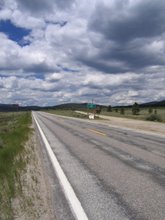Tonight, I want to reflect a bit on how we read the sacred testimony in our scripture. Where we stand shapes how we see things. Because we're so diverse, we each read scripture with different eyes. But in order to understand Jesus, we also need to put on the eyes of the people Jesus was speaking to: the common people, the poor, the outcasts, the marginalized.
I have a bad habit, and many churches in America have this same habit, of reading scripture from the only the perspective of the powerful. Our church is pretty good—maybe you don't have this problem— but I've been various communities where discussions have assumed that "we" are all on the powerful side—the story of the rich young man is a judgment on "us"; how do we respond, goes the discussion, given that we are relatively wealthy or powerful.
Putting on multiple sets of eyes is a both necessary and a hard thing to do. It is true, that living in a place where there might be violence, but not war; hunger but not starvation, makes us all relatively privileged. We need to remember that, because there's a whole world out that that says "we need more". But it is also true that many of us, in important spheres of our lives, don't have privilege: some of us have been without homes, been discriminated against at work, had the government not recognize a marriage, been chronically ill with difficulty getting health care, been afraid to come out to parents, been victims of domestic violence, been a target of racism or harassment. This is not "them", this is us, this is the church, this is who Jesus was speaking to.
So let's take the exercise of reading this story from a different perspective. From the rich and powerful, it's a story of judgment: You read the story, and you hear it's easier for a camel to go through an eye of a needle than for a rich person to enter the kingdom of God--this is horrible news.
But put on another set of eyes: you live in a world that tells you the rich have it made, that they deserve to be rich, and that because they are rich, they can do all sorts of good deeds that make them have favor with God. But then in this story, you hear that a rich young guy wants to know what he really needs to do to find favor with God—and it turns out that this guy can't do it, he's too sad. But you, you're following Jesus already, and you are doing what this guy and all his wealth can't do: picking up, following Jesus, a piece of the kingdom of God being revealed on earth.
If you didn't get it the first time, the disciples are there to ask the "dumb" question: "Look, we've left everything to follow you: what do we get?". Jesus says, "what you've left behind, you'll get back a hundredfold." This is a story of good news. Astonishing news, but good news.
I'm going to go out on a limb and guess that this story wasn't primarily designed to tell people with money what to do with it, thought it certainly is suggestive. Rather, I think this story is telling us that the kingdom of God is so important, that it brings such reward, that we should push aside anything that gets in our way, and if there's less in our way, we should be thankful.
My invitation to you is that to consciously recognize the places in which you stand, to read scripture with multiple sets of eyes, and hardest of all, to try to read it with the eyes of the people Jesus was speaking to.

No comments:
Post a Comment